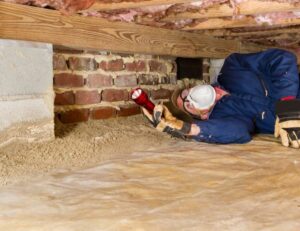Your home’s basement is more than just a storage area; it’s a critical component of your property’s foundation and overall structural integrity. Neglecting it can lead to significant issues down the line. To safeguard your investment and maintain a safe living environment, regular basement inspections are a must. In this blog, we’ll explore why routine basement inspections are crucial and how they can help you identify potential issues early, preventing costly damage.
Why Are Regular Basement Inspections Necessary?
- Early Detection of Water Intrusion: Water is one of the primary enemies of basements. Whether it’s from heavy rainfall, plumbing leaks, or groundwater seepage, moisture can cause structural damage, mold growth, and health hazards. Regular inspections can detect signs of water intrusion, such as dampness, discoloration, or musty odors, before they escalate into major issues.
- Preventing Mold and Mildew: Basements are particularly vulnerable to mold and mildew due to their damp environments. Mold growth can lead to health problems for your family and structural damage to your home. By catching and addressing moisture issues early through inspections, you can prevent the conditions that promote mold and mildew growth.
- Identifying Foundation Cracks: Foundation cracks can compromise the stability of your entire home. During basement inspections, professionals can identify small cracks in their early stages, allowing for prompt repairs. This prevents larger cracks and more extensive structural damage.
- Ensuring Proper Drainage: Adequate drainage systems, such as sump pumps and interior drain tiles, are essential for basement waterproofing. Regular inspections can verify that these systems are functioning correctly, preventing basement flooding during heavy rains.
The Inspection Process:
During a basement inspection, a trained professional will:
- Check for Signs of Water Damage: Look for water stains, discoloration, or peeling paint on walls and floors.
- Inspect for Cracks: Examine the foundation and basement walls for cracks, both minor and major.
- Evaluate Ventilation: Ensure that the basement has proper ventilation to reduce moisture buildup.
- Examine Drainage Systems: Verify the functionality of sump pumps, drain tiles, and gutters to prevent water accumulation.
- Assess Electrical Systems: Confirm that electrical systems in the basement are in good condition to prevent fire hazards.
Call Everseal Basement in Aurora, IL
At Everseal Basement, we understand the paramount importance of regular basement inspections. Our dedicated team of professionals is ready to assist you in safeguarding your home’s foundation and overall structural integrity. By identifying potential issues early and taking proactive measures, you can prevent costly damage and ensure a healthier living environment for you and your family.
Don’t wait until a problem becomes severe. Schedule regular basement inspections with Everseal Basement to protect your most significant investment—your home. Our commitment to exceptional service, expertise, and customer satisfaction makes us your trusted partner in maintaining a safe and secure basement. Contact us today to schedule an inspection and take the first step toward a worry-free, protected basement. Your home deserves the best, and Everseal Basement is here to deliver it.













